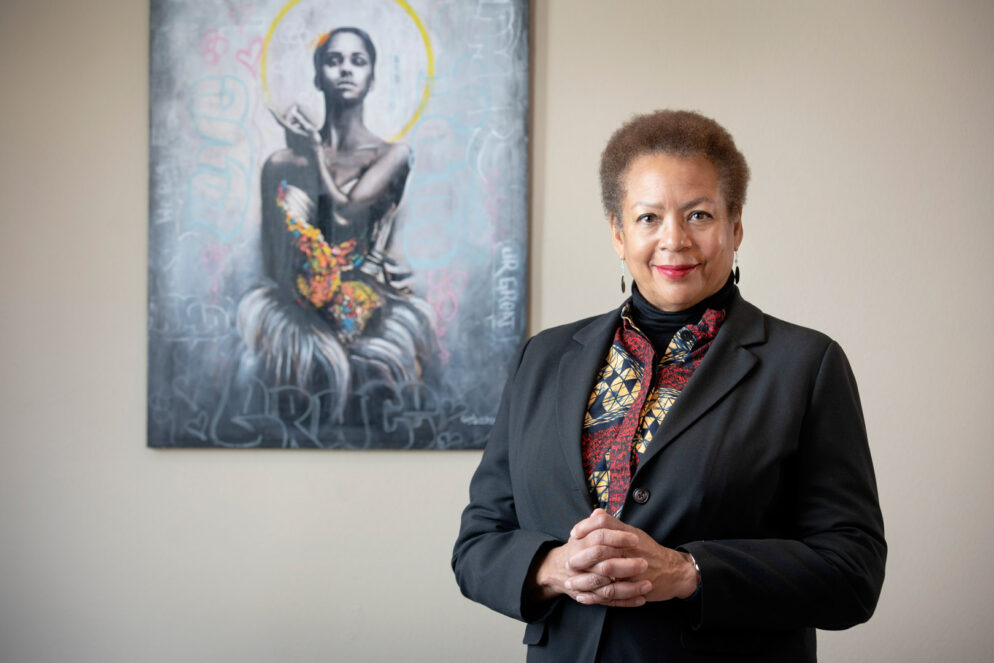Colorado College has been selected as one of the recipients of The Andrew W. Mellon Foundation’s Humanities for All Times grant. This initiative will support the college’s new General Education curriculum to teach students about social justice issues and give them the tools to tackle injustices head-on.
CC will receive $1,024,000 over three years for its project “Humanities for Our Times: From Epistemologies and Methodologies to Liberatory Creative Practices and Social Justice.” The funding supports professional development for humanities faculty engaged with Colorado College’s new GE curriculum and ongoing work toward becoming an antiracist institution.
According to the Andrew W. Mellon Foundation, these grants will support the development of new social-justice-oriented humanities curricula to equip students with the skills and knowledge they need to make the world a more just and equitable place. The funding is intended to help meet college undergraduates’ growing interest in social justice by supporting projects that teach humanities skills and methods necessary for transformational change.
Claire Oberon Garcia, CC professor of English for 30 years, is the project’s principal investigator. She says this project and the funding that will help support it represent “an exciting new chapter in CC’s response to student demands for an inclusive, relevant, and empowering liberal arts education.”
“Ever since I’ve been at CC, we have struggled with student demands to both diversify the curriculum and to require courses that help students understand power, inequality, and oppression,” Garcia says.
When Garcia started teaching at CC, she says the college had a General Education requirement called Alternative Perspectives: B, which was described as any course focused on material “outside of the Western mainstream.” Alternative Perspectives: A was a two-block class that focused on at least 400 years of some aspect of Western culture, while the AP:B requirement could be fulfilled by two separate, unrelated courses. The college revised that requirement a few years ago to focus on Global Cultures and Social Inequality.






The grant proposal briefly outlines the way these changes came about at CC and the need to reflect on how best to teach the new curriculum:
We recognize the myriad ways white supremacy has shaped our institution and have been taking steps to work our way out of its grip. Our GE requirements were developed after a 2015 student petition challenged the faculty to undertake thoroughgoing curricular reform focused on diversity, equity, and inclusion concerns. In 2018, following an external review of racism at CC, we committed to becoming an antiracist institution. At this pivotal historical moment, our students demand an education that will empower them to make social change.
CC faculty recognize the central importance of the humanities to help students identify, understand, and solve the systemic problems of racism, injustice, and oppression. This work demands that each of us reflect critically not just on how and why we create knowledge, but also on how and why we teach — and on the classroom environments we create. Centering these and related questions will position the Humanities Division, History Department, and interdisciplinary program faculty to make contributions to CC’s GE curriculum that provide our students with a significant foundation to enact social change and create a more just, equitable, and liberating society.
Garcia says the Mellon grant will allow CC humanities and humanistic social sciences faculty to develop or radically redesign GE courses to fulfill the Equity and Power and Creative Processes requirements. It also will demonstrate the enduring relevance of humanities epistemologies and methodologies for social justice work when the humanities and the liberal arts are under scrutiny. A call for proposals for new courses is going out to all CC humanities and humanistic social sciences faculty. The grant will generate dozens of new and revised courses over the next two to three years.
The Mellon Foundation, in its call for proposals, emphasized the ongoing conversation in society about the relevance of the humanities and, on a national level, what sometimes appears to be a lack of student engagement with the humanities.
“The CC grant activities will provide students, staff, and faculty in the humanities with opportunities to interact with ideas and people past and present who are working for justice and respect for all human beings,” Garcia says. Students also will be able to compete for grants that will allow them to bring humanities methods and values to social justice work beyond academia, collaboratively produce a special issue of the journal Hairstreak Butterfly, and engage in other professional-development opportunities.
The first activities of the grant will start in Summer 2022 with two Equity and Power faculty seminars and end with a conference in Summer 2024, Garcia says.
Chet Lisiecki, assistant professor of German, is the project coordinator leading the key team members. Other members of the project team are: Nene Diop, assistant professor of French; Steven Hayward, professor of English; Jameel Paulin, assistant professor of art; Natanya Pulley, assistant professor of English and creative writing; and Kris Stanec, senior lecturer in Education and faculty fellow in Creativity & Innovation.
